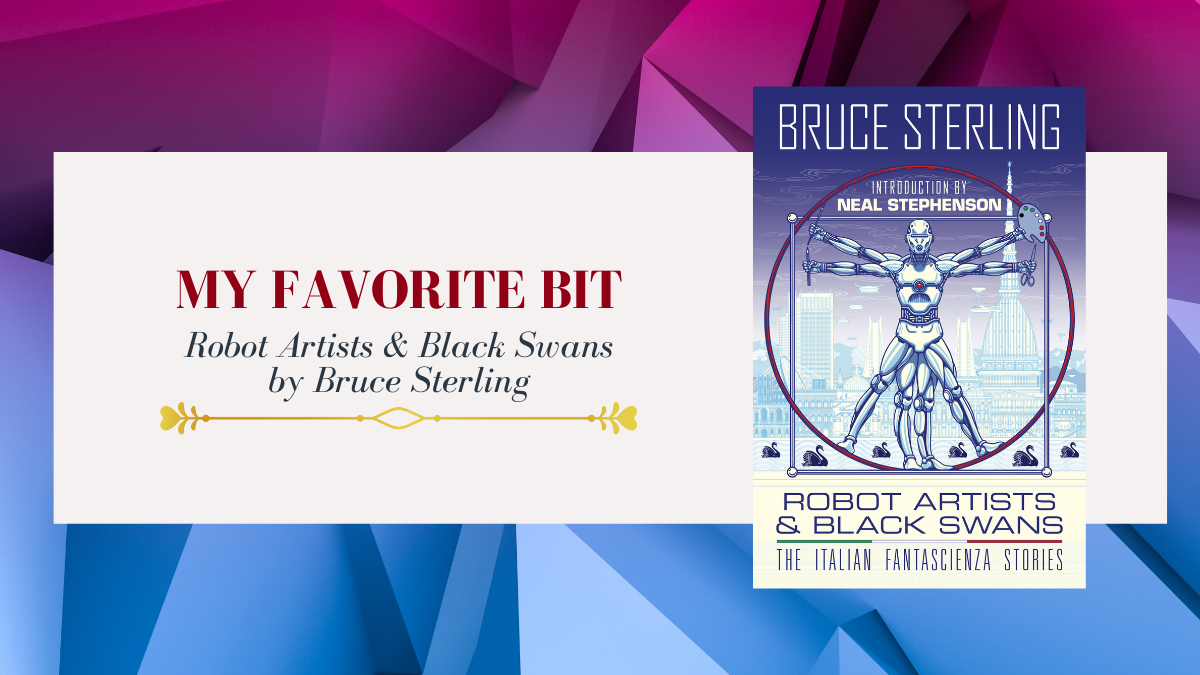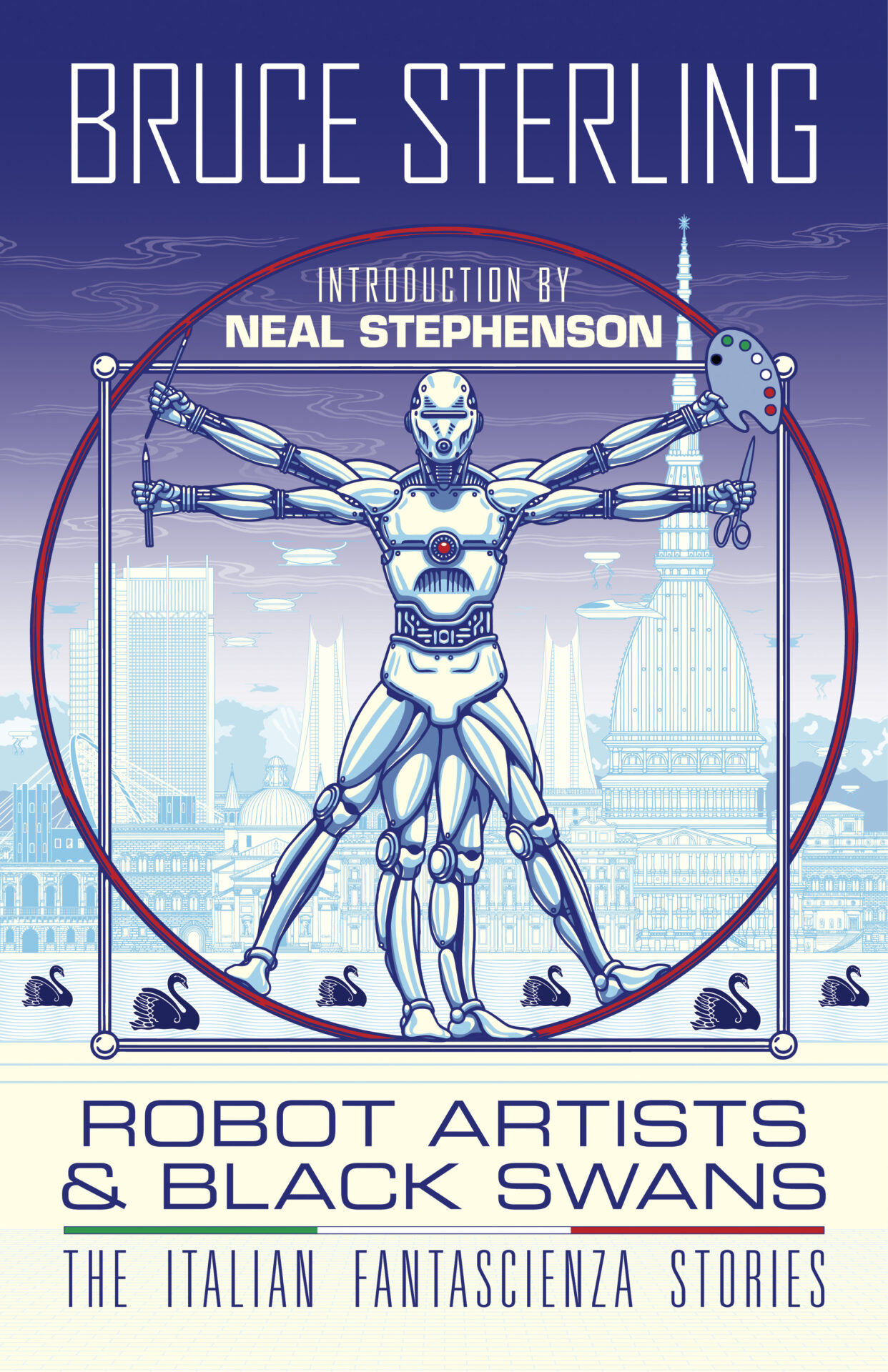
Bruce Sterling is joining us today to talk about his story collection, Robot Artists & Black Swans. Here’s the publisher’s description:
The Godfather of Cyberpunk has emerged in this new collection of Italian-themed fantasy and science-fiction stories. Bruce Sterling now introduces us to his alter ego: Bruno Argento, the preeminent author of fantascienza. Sterling, writing as Argento, skillfully combines cutting-edge technology with art, mythology, and history.
In the Esoteric City, a Turinese businessman’s act of necromancy is catching up with him. The Black Swan, a rogue hacker, programs his way into alternate versions of Italy. A Parthenopean assassin awaits his destiny in the arms of a two-headed noblewoman. Infuriating to both artists and scientists, a robot wheelchair makes uncategorizable creations.
Bruno Argento is the acknowledged master of Italian science fiction. Yet that same popular fantascienza author also is known in America—as Bruce Sterling. In Robot Artists and Black Swans, we present the first collection of their uniquely visionary Italian-themed fiction, including tales never before published in English.
What’s Bruce’s favorite bit?

BRUCE STERLING
For “My Favorite Bit,” I’ll start with my bio. I’m Bruce Sterling, I’m a science fiction writer from Texas who hangs out in Italy a lot.
I have a new book out that’s a collection of my Italian short stories. I’ve been writing these pieces for years, and they’re all inspired by my extensive efforts to come to terms with Italy. I like to extend Italy’s innate Italian-ness in some fantastic Italian directions.
The last story, titled “Robot in Roses,” is particularly messed-up.
This story was commissioned for an Italian fantascienza anthology, and I had a deadline. So, I had to cook something up on the fly. That process got out of hand, so, by my personal standards for SF world-building, this story is a junk-heap. Like the city of Rome — (a lot of it is set in Rome) — it’s a peculiar, multilayered melange of the uncertain future and some colossal relics of the deep past.
I didn’t like “Robot in Roses” much when I first finished it, because I knew it had tumbled out in an odd, left-handed way, and it lacked that squinchy, Jules Verne erudition that I tend to jam-pack into my texts. However, as time passed, its merits grew on me. It has a mysterious appeal, because although it’s written in the fancy-pants, know-it-all language of professional intellectuals, it can never clarify what it is talking about.
Also, the story is boldly up-front about its own stark failures. It’s downright fanatical about the need to be truthful, simple and frank, yet it can never achieve that. All it can do is to cheat the reader, to cruelly sabotage the mystery on the last line, and maybe even kill off the story’s hero.
Yet there’s satisfaction to that very failure. It’s as if the story is groping, even palpating, some abyssal aspect of deep being that words are not fit to express.
So that’s my favorite bit about it — all those little episodes, the many quips and jokes even, where the text of “Robot in Roses” loudly struggles to achieve higher truth and can’t touch any. It’s a buddy-story about two people who both hate mumbo-jumbo and mystification — he’s an art critic, she’s a scientist — so they haul out their full armory of scholarship. Yet, they can’t achieve understanding even with one another. They’re male and female debating-opponents wrapped in a flirtation, so they do have a sympathetic companionship, and yet their dialogue — and they’re both very combative and chatty — is forever at cross-purposes.
I have never written dialogue that flies so fast and is so oily, so weirdly friction-free. It’s comical, but it’s a comedic dialogue about the failure of language. Somehow they’ve achieved an awful fracture there that’s even worse than trying to understand Italians.
I could never have written this story without Italy, but it’s not, in fact, just a story about Italy. Italians are even the soothing presences in this tangled tale of the dire woes of a humanist and a scientist. Both the protagonists do fail — because they can never make their problem clear to themselves; they can only obliterate it, or martyr themselves for it. However, the Italians in this story somehow seem at ease with all that. They’re the hospitable hosts of this predicament. The Italians can live in the eerie presence of a Big Mystery without becoming an anguished knot of rose-briars.
Like a lot of science fiction writers, I’d rather like to solve the problem of the universe in the way that a computer scientist might resolve a programming issue, but in Italy, I’ve come to understand that I don’t have to. I still kinda want to, and likely I always will, but I’m not, in fact, required to make sense of everything, and that’s my favorite part.
LINKS:
Robot Artists & Black Swans Universal Book Link
BIO:
Bruce Sterling (Schismatrix, The Zenith Angle, Zeitgeist) is an internationally bestselling author, journalist, editor, columnist, and critic. He is perhaps best known as the author of ten visionary science-fiction novels and as a founder of the cyberpunk movement. He was also the editor of the quintessential cyberpunk anthology, Mirrorshades.
Sterling’s much-heralded nonfiction includes The Hacker Crackdown: Law and Disorder on the Electronic Frontier and The Epic Struggle of the Internet of Things. A renowned expert on technology, Sterling has appeared on ABC’s Nightline, the BBC’s The Late Show, MTV, TechTV, and Wired, where he is a featured blogger, as well as in Time, Newsweek, the Wall Street Journal, the New York Times, Fortune, Nature, La Stampa, La Repubblica, and many other venues.
Sterling splits his time among the cities of Austin, Turin, and Belgrade.
